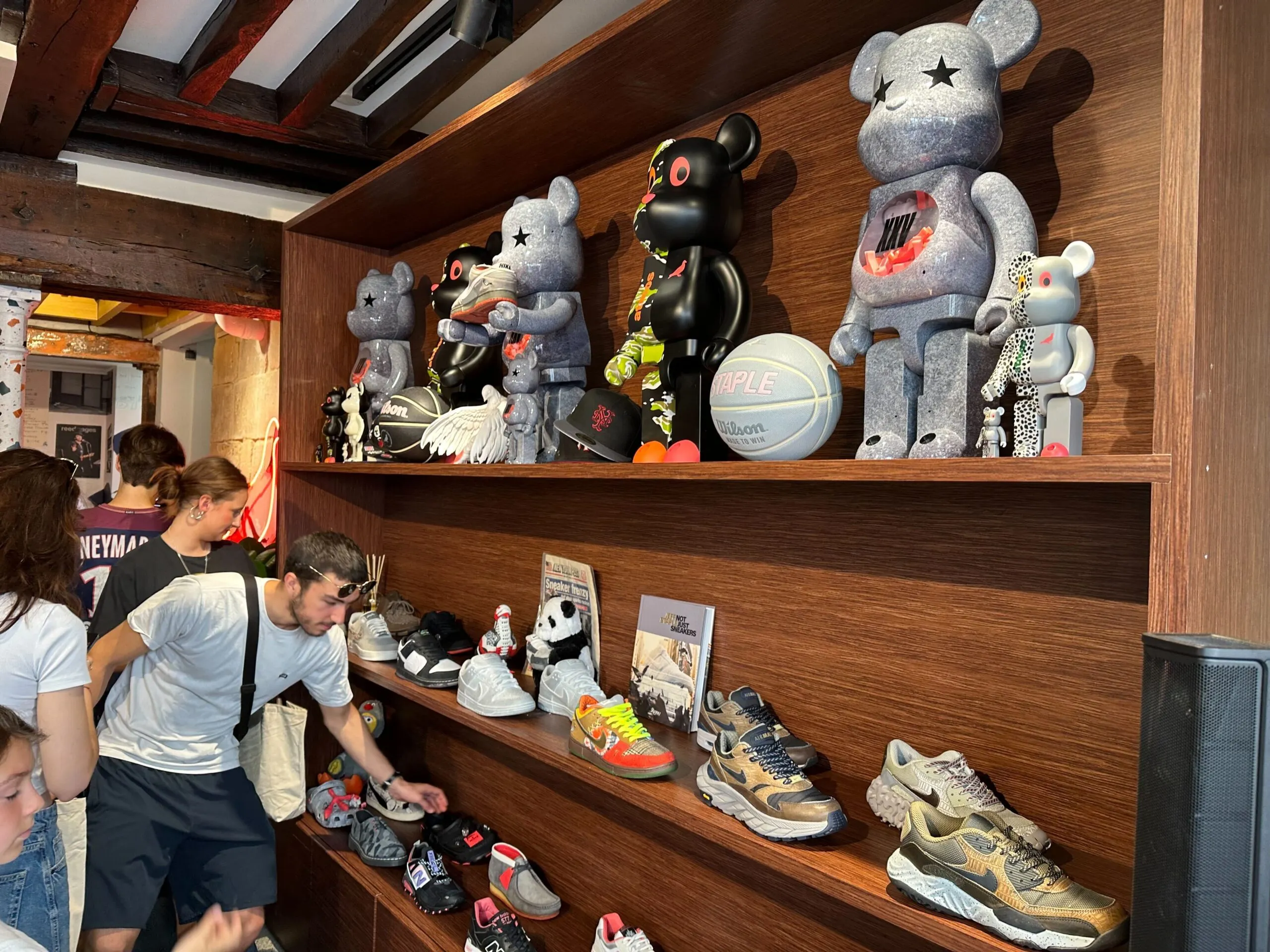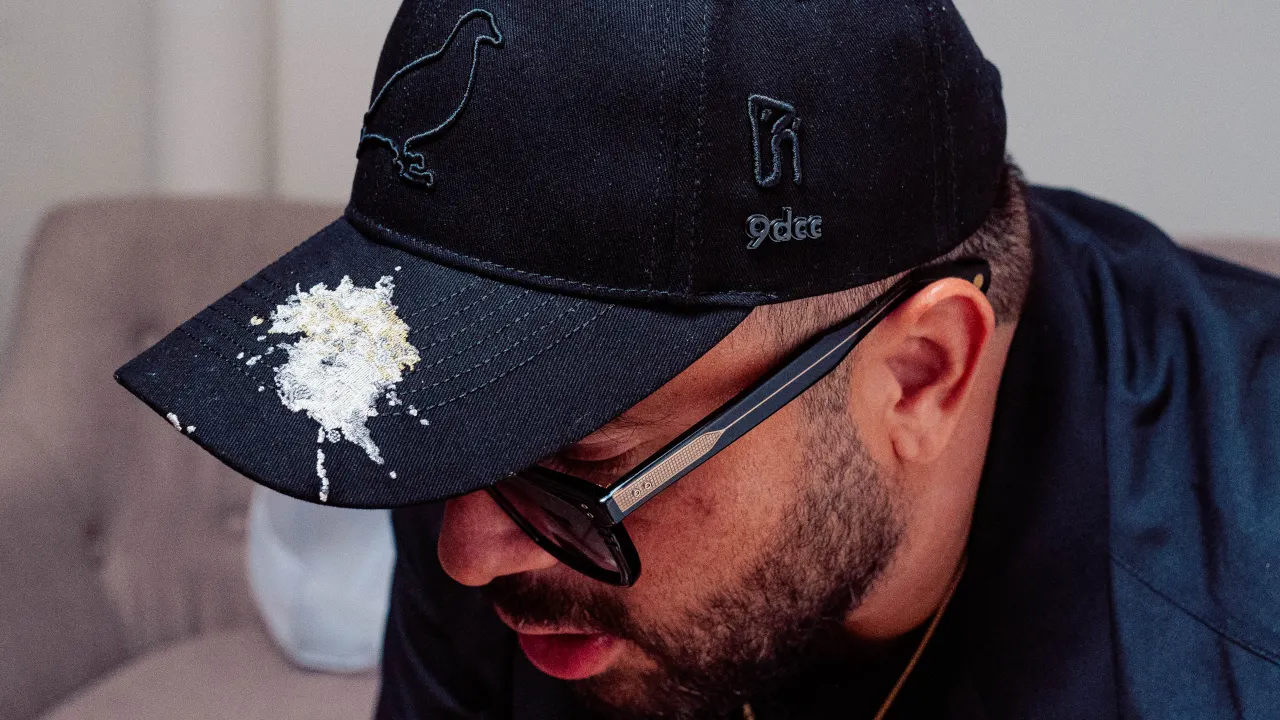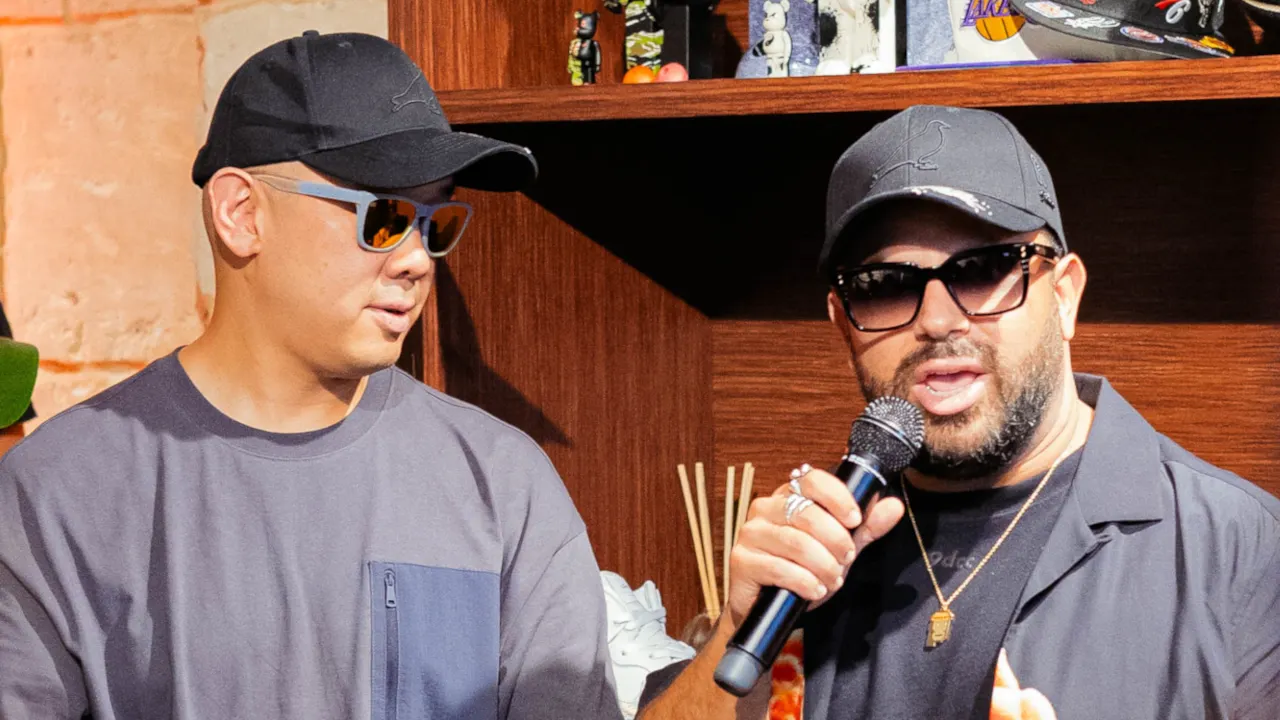In the world of crypto-native fashion, Gmoney needs no introduction. With 9dcc, the luxury brand that the pseudonymous entrepreneur launched in August 2022, he has successfully fused luxury physical fashion and Web3. In the process, he’s created a new-generation model that has become an industry benchmark.
On Wednesday afternoon, in the French capital during Paris Men’s Fashion Week, gmoney launched an exclusive limited-edition collaboration with streetwear pioneer Jeff Staple—who has his own Web3 play with the digital world, Stapleverse.
Each of the 250 9dcc x Stapleverse baseball caps (redeemable via an NFT) features the Stapleverse signature pigeon emblem in an understated tone-on-tone embroidery on the front, with co-branded metal hardware logos to the side.
It would be Succession-style stealth luxury were it not for the humorous detail on the brim resembling a splatter of pigeon poo.
“In its simplest form, it's a very beautiful hat,” Staple told Decrypt. “But there’s a ton of tech buried inside.”
The eminently connected cap integrates 9dcc’s Networked Product technology via an embedded NFC chip, unlocking interactive experiences within the ecosystems of both brands through gamification and rewards.
The Window 2 (Allow List) Sale of the 9dcc x Stapleverse baseball cap is now live at https://t.co/RLzLx6UnrT. This window is open for one hour.
The Top 150 9dcc Network Points and Top @stapleverse holders are eligible to purchase.
Opening to the general public shortly… pic.twitter.com/gnKq5er6wX
— 9dcc (@9dccxyz) June 21, 2023
Each cap also comes with a digital wearable which can be donned by Stapleverse Sapienz characters. This facility is enabled via Ethereum ERC-6551 technology developed by Staple’s team in partnership with Future Primitive, which allows NFTs to “hold” other NFTs within. It also enables “digital signatures” for connected fashion.
“It’s just like when you go up to someone like LeBron James and get him to sign your jersey,” said gmoney, using a real-world parallel to drive home the concept. In this case, gmoney or Staple could provide a digital signature via smartphone app, which is then tied to the token associated with the connected apparel.

The launch event took place at Staple’s Paris pop-up restaurant, which runs for the duration of Paris Men's Fashion Week in collaboration with three local eateries: Mao Corp dumpling bar, Eastern Mediterranean restaurant Miznon, and Jajaja Mexican taqueria.
The idea aligns with the 9dcc treasure hunt that gmoney ran during NFT NYC in April, which kicked off at his favorite bodega in the East Village.
“Instead of doing a fashion show or a showroom where we work our asses off for 12 hours, we decided to create a place where people can come and hang out,” said Staple.
Connected fashion
In fact, it was in the pop-up's upstairs VIP section that Decrypt sat down with gmoney for an in-depth conversation about the connected future of the luxury fashion industry, and the significance of combining state-of-the-art blockchain technology with just this sort of storytelling-infused community experience.
The thought leader described how its conflation with blockchain is ushering in a new era and redefining the concept of luxury.
According to gmoney, an aspect of particular value for the fashion industry that’s arising from Web3 is the latter’s focus on the aforementioned community and experience—with the consumer “being a part of the process as opposed to just being sold something.”

“I think that is super powerful, and that, to me, is the definition of the new luxury,” he said.
While he acknowledges, of course, that quality of craftsmanship and product is paramount, luxury is also about “creating an amazing experience on top,” he said.
As evidenced by the POAP functionality—that is, the ability to claim a ticket stub-like NFT for attending events—that is integral to his own 9dcc brand, harnessing technology to encourage people to connect in real life is key.
“The most amazing part of the human experience is connection,” gmoney said, “whether that’s a significant relationship or even just a casual hello. That is what the POAPs allow us to do.”
“They let you put that human element on-chain to memorialize your interactions in a digital environment,” he continued. “That is the essence of what we’re doing here. I’m trying to build a community of like-minded individuals—early adopters who want to push the tech forward.”
The blockchain element means that power rests with the community without their data being held by social media behemoths. The gamification of this experience via challenges and rewards, as demonstrated by initiatives such as his bodega treasure hunt, lets the purchaser become part of both the story and storytelling alike.
“Storytelling is important to any brand that’s selling a vision,” gmoney said. “For thousands of years, we’ve connected through storytelling. That’s what fables are—understanding things through a story.”
“If people see a brand that has similar values, they want to join in and be part of it,” he added. “They are like, ‘I really identify with this, so I love it.’”
Louis Vuitton leads
Conversation turned to Louis Vuitton’s Web3 “Via” debut and how it compares with the strategies of its competitors. The luxury giant recently launched a limited number of tokenized “Treasure Trunks” for €39,000 (about $42,700) apiece, promising exclusive benefits and experiences alongside one of the physical trunks.
“From the outside looking in, it was very on brand, very Vuitton,” gmoney said.
“I also thought it was great that it was featured on the main louisvuitton.com website and users were not directed to some random place,” he said, describing how some traditional brands are reluctant to push their on-chain endeavors outside of the Web3 community.
Staple agrees. “While other brands have just dipped their toe into Web3, Louis Vuitton went all in,” he said, “which was a major signifier.”
Case in point: Pharrell Williams’ Louis Vuitton debut show on Tuesday in Paris featured the orange Speedy colorway (the Via Speedy 40), which will be available exclusively to holders of the Maison’s Via Treasure Trunk tokens.
.@Pharrell absolutely stunned in his LV debut.
An exclusive bag for VIA Trunk holders was unveiled, while Pharrell himself was dressed in an all-pixel fit.
This is a moment to be celebrated. I’ve never been more excited about the future. Web3 has never looked SO GOOD!!! pic.twitter.com/zNLu2HJQZj
— seedphrase (@seedphrase) June 21, 2023
While gmoney has been integral to Adidas’ Web3 play, he is also an “unofficial Prada ambassador,” or as he describes it, “a friend of the brand.”
“Luxury houses play an important role in developing culture,” he said. “It’s been interesting to learn about how these brands approach everything they do. They need to be at the cutting edge of what is happening, but also true to themselves and their brand—protecting it at all costs and just not jumping onto a trend because it’s popular.”
And if he were to offer any advice to luxury houses eyeing the connected opportunity that Web3 provides?
“I think every brand should take a unique approach that speaks to them,” gmoney said. “Now is not the time to rush in, as people did in 2021. It’s about being authentic to their heritage and their brand, taking their time, and being really thoughtful about how they are going about it.”
Looking forward, he is bullish about the “intersection of physicality and digital aspects, and that it’s no longer a matter of either/or.”
“I think there’s going to be a lot more ‘interwovenness’ that happens on the edge,” he concluded. “And that is where we try to position 9dcc.”
